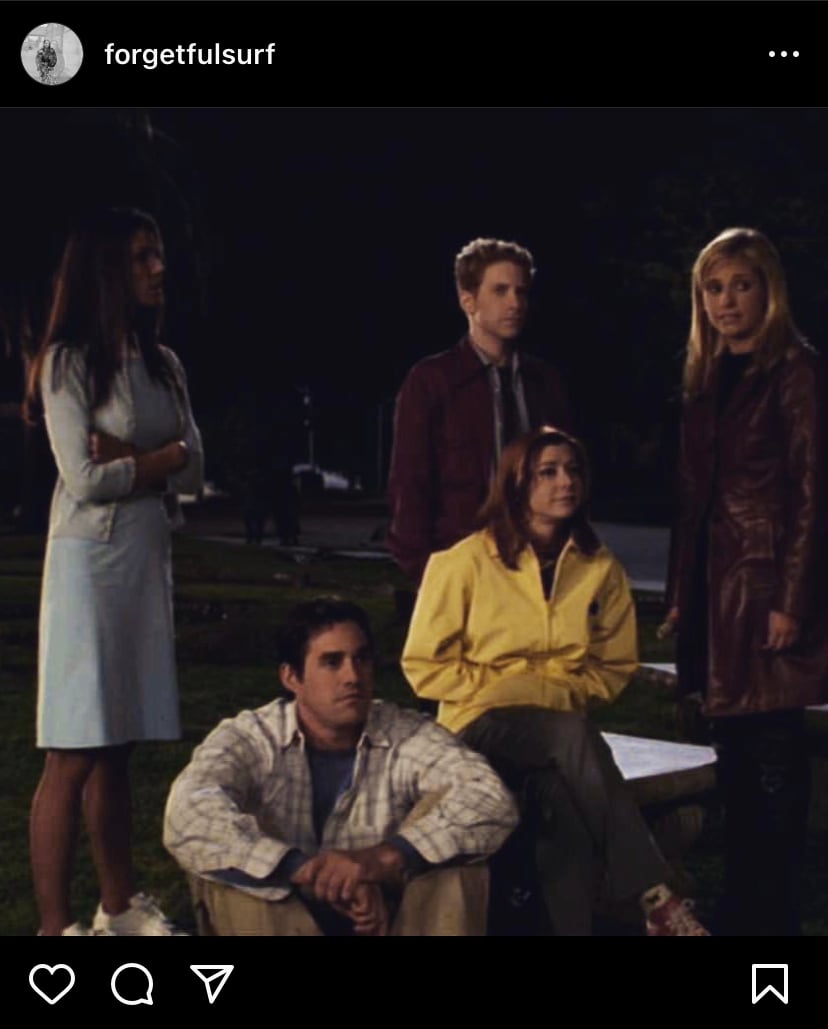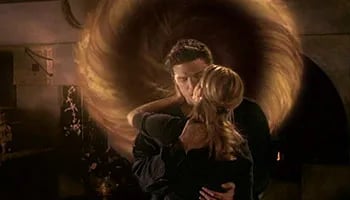Some Things About Buffy
Some Things About Buffy
1. On 27th May, 2016, when I finished school, I posted a picture to my instagram of Buffy Summers and her friends standing around outside the burned ruins of their high school. I remember very clearly how I felt in that moment: I was unsure of myself, and fearful of the future. But I was also surprised and awed that I had made it through an experience I had hated. High school, for me, really was hell. And I thought of that scene in Buffy at the end of the third season, when the main characters gather after a huge battle that burned down their school, and Oz says, we survived.
It was quite the battle, says Buffy.
No, says Oz, high school.
So I found the picture and I posted it.

2. Describing Buffy, the show, is actually quite hard. It combines several things: nineties slashers, supernatural thrillers, and teen drama are the main ingredients, but there’s also some sword-and-sorcery, the odd experimental turn (for broadcast TV) and also a musical episode. Sometimes it’s kitsch and sometimes it’s just bad; sometimes it’s frivolous and sometimes it’s deadly serious. To say that this is what it’s like to be a teenager verges on truism but it is, also, true. And, of course, this was something I had rarely seen before in television - I grew up on the Doctor Who revival, Merlin, but that was almost it for me. I was a book kid, obviously. I was actually introduced to Buffy by a really cool teacher, after some confusion in an exam hall when it transpired we were reading the same trashy vampire novel at the same time, and she pointed me straight to the source. I was thirteen, I didn’t really know myself (what thirteen-year-old really does?), and I got through the show ravenously, realising for the first time what I’d been missing. It’s easy to reduce this to the ways in which the show was groundbreaking for its time, but none of that inheres in the material, especially at what was then a decade-plus distance, and I’m not sure I knew when I first watched that, for example, Willow and Tara’s romance was the first ongoing lesbian relationship in American prime-time drama. What I did know was how real that romance felt, and how important to me it was to see characters come into themselves.
For all that Buffy is a lot of things, it is also one thing, and that thing is the blueprint. Buffy, the character, is the archetypal strong female character, and it mixes monster-of-the-week antics with season-long story arcs against a backdrop of personal and romantic drama. (That season-long villains in any show are often referred to as Big Bads, a Buffy line, is revealing.) It’s also quippy as hell, with almost every character being as quick with a pun or cultural reference as they are with a stake or an axe. With the success of Buffy and shows like it, this became the go-to format for TV drama for a long time: without Buffy and its spin-off Angel, there’s no Doctor Who revival or Torchwood, no Veronica Mars, no Teen Wolf or Supernatural, probably even no Riverdale. And in a literal sense, there’s no MCU as we currently know it - Joss Whedon, the creator of the show, directed both The Avengers and Age of Ultron and his distinctive dialogue is now the much-parodied idiom for practically all blockbusters.
3. Being a Buffy fan, though, has also meant, for a good while now, possessing a deep knowledge that the artists you respect will let you down. I will bracket the real-life accusations against Whedon here, but suffice to say that they are consistent, widely-corroborated, and appalling. Rewatching Buffy with an ex a few years ago, and finally finishing Angel on my own over the last few weeks, it is also very clear to me that authorial misogyny and arrogance has its fingerprints all over both shows. Buffy might be super-strong but this makes her super-fragile. Tara dies basically to further Willow’s plot arc. Willow becomes a powerful witch but becomes addicted to the power and eventually, inevitably, breaks bad. Cordelia falls into a coma with a minimum of explanation after having an affair with Angel’s son and almost bringing about the apocalypse. Timid, gentle Fred is abruptly killed and replaced with an immortal Old One who wears her face and lots of skin-tight leather. (Allegedly this was meant to be undone but the abrupt cancellation of the show, after Whedon tried to force the network to renew early, meant it never was.) Male characters suffer too, but both Buffy and Angel, as shows, resolutely fail to imagine a woman who can be happy.
There’s more specific things too, and one will have to stand for all here. In Buffy’s second season, she consummates her relationship with Angel, a vampire cursed with a soul, learning that the curse stipulated that if he experienced one perfect moment of happiness his soul would vanish again, and he would revert to the personality of Angelus, one of history’s most prolific mass-murderers. Over the following season Buffy struggles with her guilt at having set Angelus free, which at times shades into an unpleasantly literal exploration of what happens when you trust a man who is not what he claimed. This is ultimately played as Buffy coming to understand that what happened was not her fault and learning to trust again: progressive! But the actual mechanics of the metaphor, I think, render Buffy just a tool, an actor without agency in a play she doesn’t know about. In Angel’s fourth season, a magical illusion persuades a re-ensouled Angel that he has had another perfect moment of happiness with Cordelia and sure enough, out pops his soul again. The first time it’s tragedy, the second time it’s just a shadow-play, where it’s not even the real Cordelia but, magically speaking, a cardboard cutout who exists solely to fulfil the curse, Angel’s curse. (This episode frustrated me so much on first watch that I stopped watching Angel for several years.)
4. I spent a lot of my adolescence feeling that I was somehow different from everyone around me, that I didn’t fit, and that most importantly I didn’t know why. I am trying not to speak lightly of something that was very painful to me at the time, only generally, because I think a lot of people that I know can relate to this. It’s easy to interpret Buffy in this light as wish fulfilment: Buffy is different from everyone else, because she’s a slayer. Willow’s gay, and she’s also a witch. Oz is a werewolf, Anya’s a demon, Angel is a vampire with a soul; practically every character is marked by some kind of divergence or difference from the norm. One word for this is queerness. But even before we learn to read cultural texts in this way, we (that is, teenagers, queer teenagers, depressed teenagers, teenagers who find themselves, for some reason, on the outside) can find these threads in anything if we set our mind to it. I don’t, however, think that Buffy is about pure wish fulfilment because of how rarely the identification of this difference turns out well. It’s more provisional than that. Sure, Buffy meets her Scooby gang and they all hang out and go to the Bronze and graduate together, and some of them leave but they meet new friends, and so on. But so much of Buffy is about not understanding each other, not getting on, making bad decisions. A lot of the time these are forced decisions: kill your boyfriend and save the world, sacrifice your life for the greater good, leave your girlfriend to literally tame the wolf inside you. Every time a character makes such a decision, they are shut off from the world, because who can understand the enormity of those personal consequences?

The clever gambit of the show, and what I think makes it hold up for me after so long, is that actually many teenagers can understand how that feels perfectly well. I’ve certainly never saved the world through making a difficult call but I know how keenly I felt for every character that did so. What put this essay in mind for me was actually my finally finishing Angel, thirteen years after thirteen-year-old me watched the Buffy finale just in time to be done before starting a new school; it was a strange full-circle moment that carried with it a weight of feelings that I have, for the most part, left behind me now. For one secret ingredient of Buffy is time: a season of 22 40-minute episodes, while numerically close to today’s norm of ~13 hour-long episodes, necessarily encompasses so much more than the latter, making characters people you have lived with through more change - more happens in season 3 of Buffy than in two seasons of many contemporary prestige dramas - and over a longer time. Characters become people that you know much more readily in that setting. And of course I’ve been ruminating on the show, consciously and unconsciously, for much longer than that. I never bought a What Would Buffy Do? wristband, but I’d be lying if I said I’d never asked myself the question. Because what you relate to can also become a kind of blueprint and a blueprint a kind of map.
5. When you love something so much before you really know who you are, it becomes a part of you. This is natural but it can also be uncomfortable. Admiring a creator becomes admiring their work; provisos on provisos. But it seems silly to me to deny that you ever cared for something that, in certain lights, is written through you like a stick of rock. I had the uncanny experience a few years ago of rewatching the early seasons with my now-ex, and they liked it a lot, but I occasionally felt exposed by it, like drawing the curtains on a room after weeks of piling up laundry and vegetating in bed. It was different to the way we watched things together usually, and I was torn between wanting to show them everything and wanting to hang back, keep it for myself. As my feelings about Buffy became not weaker but more ambiguous, I had imagined it might be easier to leave them in the past, to disclaim them, disidentify with them. This was naïve, because while I was taking my A-levels, I became besotted with the classics of Gothic literature, with Shelley, Stoker, and Le Fans. Because in 2020 I got heavily into the films of Dario Argento, into giallo, and from there into slasher horror. Because I am (still) working through The X-Files and am a frequent visitor to my local occult store. The benefit of hindsight draws these interests into a constellation that looks a lot like Buffy Summers (or perhaps Willow Rosenberg). The past is never truly through with you, that’s just a fact. But I’m trying to let it go. If you don’t know where you’re going, and I never really have, it can at least help to know where you were.